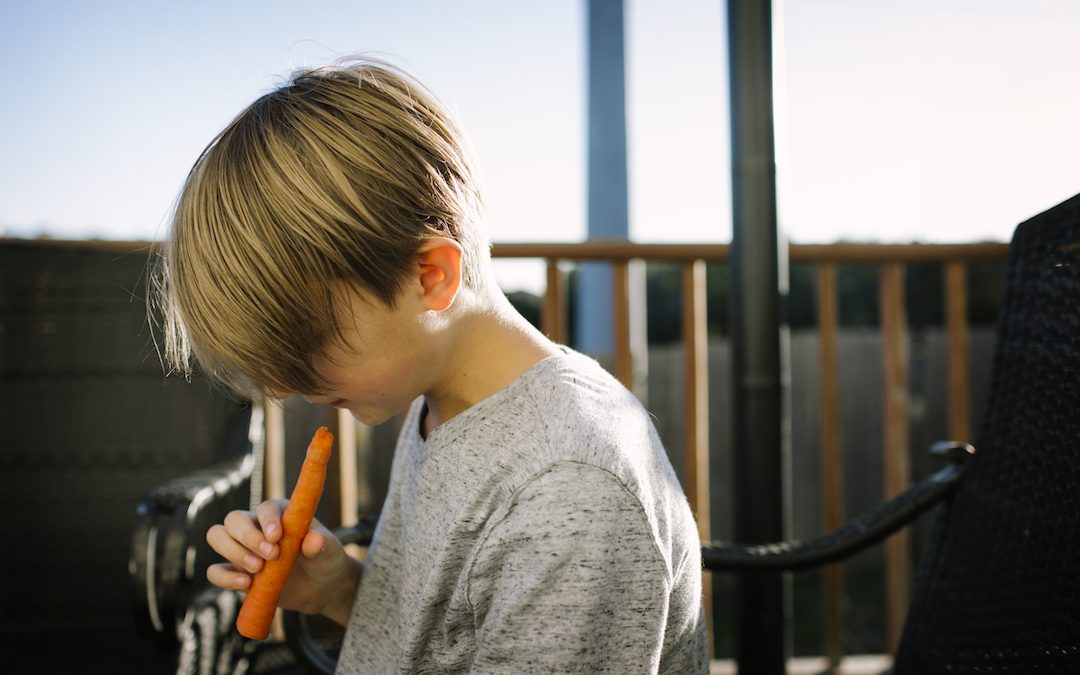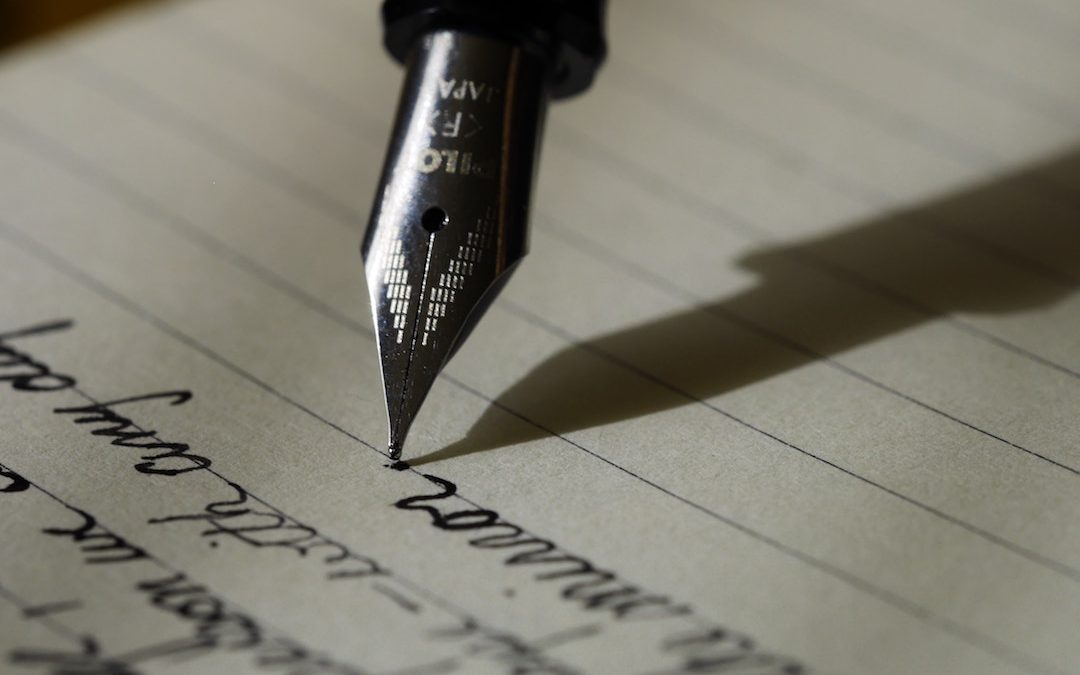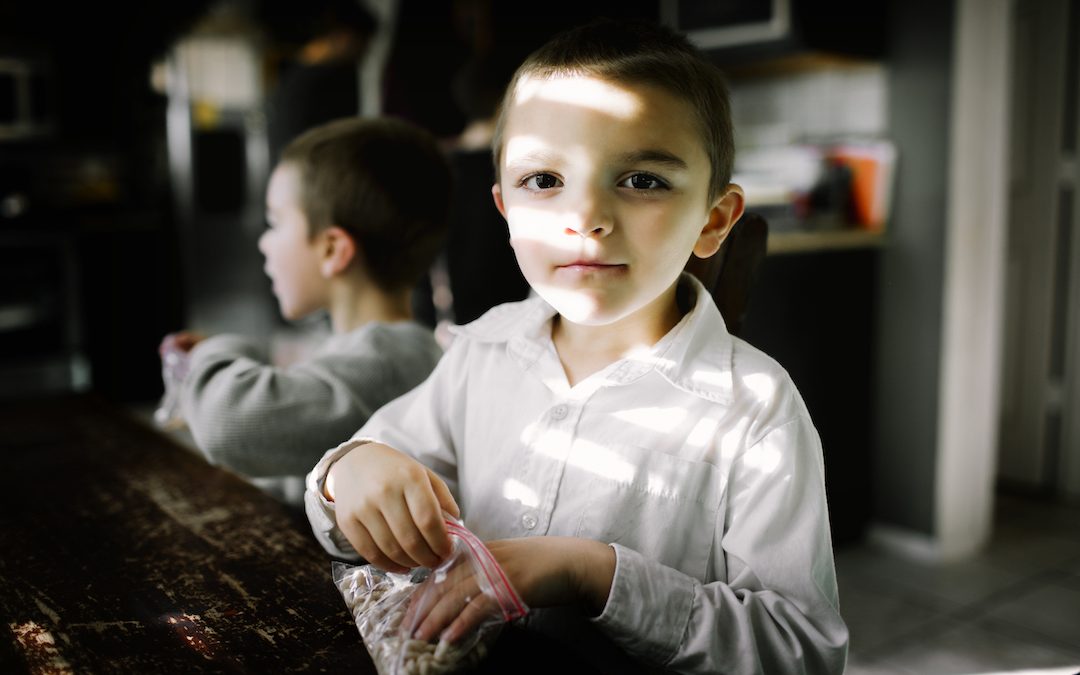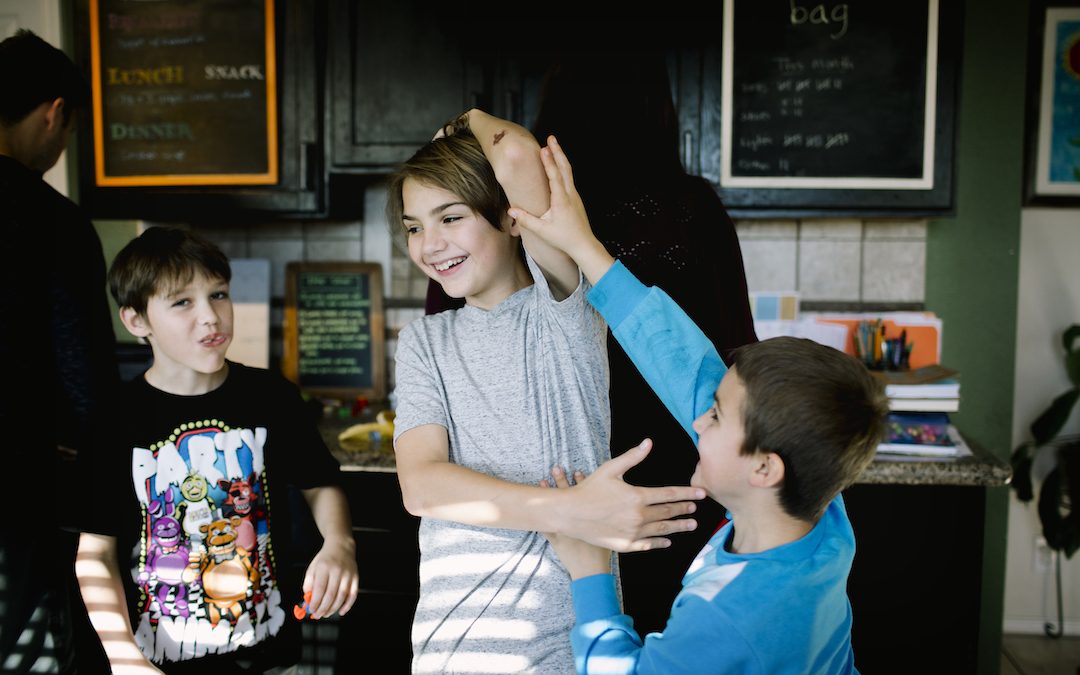
by Rachel Toalson | My Books
“Did you write on your books when you were in school?”
Yes. Of course.
The cover for Textbook of an Ordinary Life began with a question and an animated discussions about the sorts of things my husband and I would write on the paper covers of our textbooks in middle school and high school—I recorded fleeting crushes and drew ornate flowers and penned the names of friends in bubble letters, along with the occasional lines of melodramatic poetry; he wrote lyrics to songs he would finish later, punctuated by phrases in hand lettered sophistication and pictures of things in his classroom—an effort to keep himself awake during a particularly dull time.
Textbook of an Ordinary Life is a poetry book laid out by subject—English, Science, History, Math, and several more—and its cover looks very much like one of the brown papers I used to cover my textbooks in high school (I rebelled against the plain white ones teachers handed out and used brown shopping bags instead). My husband took a brown Trader Joe’s bag, flipped it inside out, and then doodled by hand (you’ll see a heart drawn around the initials BT—Ben Toalson—and RP—Rachel Patton, though we didn’t meet until college) a much better version of what my book covers looked like in school.
This collection of poetry is intended to illuminate the growing and changing nature of our lives, at every stage. Which makes this cover—a decorated and doodled-on book cover—perfect.
More info about the book
Textbook of an Ordinary Life, publishes Nov. 6, in paperback and ebook form.
Blurb
Textbook of an Ordinary Life is a collection of poetry and prose that examines ordinary life with extraordinary curiosity, wisdom, and insight. With grace and eloquence, poet Rachel Toalson examines the pleasures of reading, the meaning of measured silences, weather, the masks we wear, the unexpected delight of running, art criticism, the soul of music, wandering, regret, love, and many other wonders of ordinary life.
The poetry in Textbook is divided into subjects like English, History, Science, Math, Social Studies, Art, Music, Geography, and Philosophy.
About the author
Rachel is the author of three poetry books, This is How You Know, Life: a definition of terms, and The Book of Uncommon Hours; and a middle grade novel-in-verse, The Colors of the Rain. She has been writing poetry since the time she could hold a pencil and form what passed for letters on the page. Her first introduction to poetry was the brilliance of Shel Silverstein, whom she still reads today. She recently exposed her sons to the hilarious Jack Prelutsky poem, “Homework! Oh Homework!” which was one of her favorites as a kid. They loved it (as she still does).
Her poems for children and adults can be read in literary magazines and online publications around the world.
Rachel lives with her husband and six sons in San Antonio, Texas. She daily reads poetry (as well as many, many books) to her children, because poetry, she says, contains the essence of life, and reading, she says, is the gateway to a future of promise.
First chapter
Tracks
I walked along the
railroad tracks today
where my brother and sister and I
used to spend
our afternoons as kids.
I sat on the rails,
felt their cold gnaw
through my jeans,
watched the rain,
listened to my children wonder,
from the car, at the
newness of an experience:
this abandoned train track
that held pieces of
their mother’s childhood.
And it all sounded
like poetry to me.

by Rachel Toalson | Poetry, Wing Chair Musings featured
When I was a little girl,
my mother would take me
to the library every week.
We lived in a tiny town,
with little else to do.
These days were my favorites.
I’d run my hand along
the old book spines,
taking my time choosing
the ones that I would
carry home with me,
the ones that would
carry me away for hours.
I would gather as many
as I could manage
in my spindly arms,
and my mother, knowing that
I would read them all in
the course of a week,
would check out every one of them
and then leave me
to my words.
The library was a place
where the world expanded,
where I learned that it was possible
to be more than just
a poor girl from a poor family
who would never amount
to anything spectacular or significant.
The library brought every possibility
to my fingertips and said
it could happen for me.
The library gave me knowledge
and perspective and a way forward
through every circumstance
that found me.
And so the library
was essential to becoming,
to understanding,
to enduring.
This is an excerpt from Textbook of an Ordinary Life: poems. For more of Rachel’s poems, visit her Reader Library page, where you can get a few volumes for free.
(Photo by Helen Montoya Photography.)

by Rachel Toalson | Crash Test Parents
There’s a boy in my house who requires constant, relentless reminders, even though he’s ten. I’m well aware that things could change as time does its maturation work, but I suspect he may always have a tendency toward forgetfulness. That’s a prediction based primarily on one fact: he’s very much like his daddy.
Sometimes, when he’s talking, he will forget what he’s saying in the middle of a sentence, and, rather than try to figure out where he was going, he will contentedly leave it hanging unresolved for everyone else. We’re either falling asleep or riveted, and both end in jarring realizations: one that he’s finally finished (or is he?) and the other that we may never know what it was he meant to say. If we like neat and tidy endings, this will drive us crazy for at least an hour. Not that I know.
The other day this son came downstairs and said in a voice that could only be described as urgent with a little bit of panic on the side: “I really need you to sign my permission slip.”
“What permission slip?” I said.
“The one I brought home.”
“Where is it?”
He looked at me like I had tentacles growing out of my face. “I put it on the counter,” he said.
I looked at the counter, where, after a week of not sorting through papers brought home from school, had a Leaning Tower of Papers (there are a lot of them around our house).
“You’ll have to find it for me,” I said. “I don’t have time to do it.” (I had a squirming baby on my hip who was begging for food.)
It would have been easier if I’d just done it myself, because by the time he was finished looking for this permission slip, there was no tower in sight. There was only a paper counter. As in, a counter made of paper
I signed the permission slip, handed it to my son, and kissed him on the mouth, even though he now prefers the cheek. Half an hour later, I found that same permission slip on the table, along with his homework. I raced the permission slip up to the school but left the homework where it was. I’m willing to let him face the natural consequences of getting a fifty on his homework if he forgets it but not the natural consequences of missing a field trip because he left his permission slip at home.
I hardly ever see this kid’s school work, because he typically forgets it at school. He is the four-year recipient of the Grossest Lunch Box Ever, or he would be if such an award existed, because he forgets to bring it home most frequently and perpetually. He’s the kid with the most pairs of shoes out in the van because he forgets he was wearing any once we’re home from wherever we went.
He’s also the kid who most consistently leaves things out and, hence, misplaces them. He will peel off his skinny jeans because he doesn’t like how tight they are and I made him wear them for family pictures, and then, when it’s time for said family pictures, he won’t be able to find them. He will blame his brothers for stealing all his LEGO mini figures and then find them in a box in his room, where he put them before he left for school today so his brothers wouldn’t mess with them. He will misplace autobiographical journals and find them buried under a carpet of books in the library (I can’t be held responsible for reading misplaced journals. Just saying.).
He is the kid who brings home the most notes about missing homework, has the largest fine at the library, and needs the most plentiful number of socks. His organizational skills (or lack thereof) have cost us quite a bit of money and time over the years.
I think I might just have to get used to that.
He’s ten now. The other night we went to church, and he had to bring all his new LEGO mini figures inside with him, crammed into his pockets. We were at the church a little longer than anticipated, and because his mom gets a little anal about the proper amount of sleep, we were rushing to get out of the parking lot.
We were almost to the highway that takes us home when our son said, “Oh no!” in that panicked voice he reserves for Things That Are Lost Forever. I knew what he was going to say before he said it. “My mini figure!”
“We’ll be back on Sunday,” Husband said. “You can get it then.”
We crossed our fingers for a docile agreement.
But this boy happens to be our strong-willed boy, too, so what we got was the complete opposite: crying and raging and calling us the Worst Parents Ever for about fifteen miles down the road, and then, for the rest of the trip home, a series of blaming exercises, during which he invented elaborate stories about which brother had been responsible for the disappearance of this mini figure.
Half an hour later, we were home. He got out of the car and stuck his hand in his pocket—the why doesn’t matter; it’s the what that counts.
What did he find?
The missing mini figure. It had been there, in his pocket, all along.
He smiled sheepishly, apologized to everyone he’d blamed (which was everyone in the car), and said, with a nervous laugh, “Maybe I should check my pockets better next time.”
You think?
This is an excerpt from Hills I’ll Probably Lie Down On, the fourth book in the Crash Test Parents series. To get access to some all-new, never-before-published humor essays in two hilarious Crash Test Parents guides, visit the Crash Test Parents Reader Library page.
(Photo by This is Now Photography.)

by Rachel Toalson | This Writer Life, Wing Chair Musings
One of the most difficult and yet important pieces of the writer life is believing in yourself and believing in your work.
I have a book that just launched into the world (two days ago, to be exact). This is my first traditionally published book (but certainly not my last). I am currently in the launch season, and I’m feeling all the feelings that a writer can possibly feel. Nervous, ecstatic, terrified.
Yes, mostly terrified.
Is it really a good book? Will others think so? Am I good enough?
That’s what it really comes down to: Am I good enough?
Earlier in this pre-launch season, I was having dreams that various people at my publishing house would come to me and say, “Oh, never mind. We’re not publishing this book.” Dreams where no one bought the book and online reviews were filled with hate and criticism. Dreams where my book vanished in a cloud of gray smoke, just another unremarkable book in a world of them.
My husband is a very perceptive man. He has noticed my distraction, and, though he has been baffled by it, he has also been angered (in a good way) about it. The other day he stood in front of me, wrapped his hands around my upper arms, and said, “Do you believe you deserve this?”
Do I believe I deserve this? I wasn’t really sure how to answer the question.
Do I?
In some ways, yes. I work hard both to improve my craft and to produce the best stories I can possibly produce at any point in time. I put in the work—I get up at 4:15 in the morning so I can squeeze in some writing before my kids start begging for breakfast. I write in the afternoons, when I could be hanging out with my kids. I write in the evenings, sometimes, when I could be sleeping.
I write daily. I practice all the time. I focus on what needs doing, and I do it. I always have.
But in most ways, or at least the ways that matter, no. I don’t believe I deserve this.
I grew up in a home where my mother supported everything I did—to the point of keeping, still, now, a box underneath her bed with all my writing compositions from grade school on into college. But there was a missing dad. And when there’s a missing anything, we grow up with a large hole inside us, a hole that whispers:
You’re not good enough. You never will be.
You don’t deserve this. You never will.
It’s only a matter of time before they find out you’re nothing more than an abandoned girl.
This persistent whisper can derail a writer. Because the mental game is most of the game.
I have fought hard for this dream. I started from the ground up; I had no connections, no credits, nothing to recommend me to the world except a story and a drive to work hard and a conviction to be better tomorrow than I am today.
But maybe—well, maybe that was enough. Maybe it still is enough.
Do I deserve this? Yes. I do.
Do you deserve this? Yes. You do.
Believe that your hard work and persistent practice will pay off. Believe that you can reach your dream. Believe that your dream is glad you have found it, embraced it, fought for it.
Mostly, believe that you deserve it.
by Rachel Toalson | Poetry
an arm wrapped
around shoulders
or wrapped around
a waist
carrying the hurt one
out the door
loading up
leaving all
the work behind
at the drop of a foot
an ear turned
to a lover’s call
a cry for help
even if it
isn’t the first
a sandwich made
in the busy
a water bottle
filled by the bed
time carved out
to tend to a
lover’s list
even though hours
are too short
the rumble of breath
in the dead of night
comforting in its
familiarity
words whispered
in an ear
cutting through sleep
and warming
the one they meet
a book saved
from a plastic bag
and given during
need
a foot rub
or scalp massage
when sleep is
what’s needed
but it just won’t
come
a kiss
on the mouth
light and soft
and lovely
stolen in all
the silent moments
a flutter deep down
in the same place
it was all those
years before
this is how
you know
This is an excerpt from This is How You Know: a book of poetry. For more poetry, visit my starter library, where you can get some for free.

by Rachel Toalson | Crash Test Parents
The other day we were driving in our van, and the boys wanted us to turn on the radio, which they tried to communicate by asking twelve times, in quick succession, “May we please listen to the radio?” We didn’t even have time to answer before the next one would ask in the exact same way, not even varying the words or tone. It was somewhat alarming.
In a house with so many, I’m regularly astonished by things like this.
The problem with turning on the radio when we’re in the car is that as soon as the music begins blaring into the backseat (Husband and I adjust the direction of the radio so we can talk in the front—cars are the best places to talk, because all the kids are strapped in with nowhere to go. Although sometimes that can also work against you.) the nine-year-old suddenly remembers that he has five billion words to say. He will accomplish this spectacle of word-vomiting, or attempt to accomplish it, by yelling his thoughts and random observations over the din of the music. Which then makes his brothers yell, “Be quiet! I’m trying to listen to music!” in some nice and not-so-nice ways so that Husband and I then have to address issues of honor and respect with a diatribe on how brothers are forever friends, after which everyone in the car says, “What?” because the music is still on and nobody heard a word.
Husband will turn off the radio and say, “Speak in an honoring way to each other.” And then he’ll turn it back on, eliminating the possibility of counter arguments.
One of the most interesting things about my children is this contrast between what they don’t hear and what they do.
The other day we were, again, driving in the van with the radio blasting, and we’d just told (or shouted to) our nine-year-old to stop hitting his brother, and he said, “What?” three times. We turned off the radio and told him, for the fourth time, to stop hitting his brother, and then we turned the radio back on. The volume of the music was exactly the same as it had been. Husband, in a normal speaking voice, mentioned his name—to me, not to him—and he heard everything that was said after the mention of his name. He even repeated it back to us, word for word.
Tell me how this can be possible.
My sons can’t hear me say that they must have all the LEGO pieces cleaned up by the time the timer goes off or the LEGOs will be in the sad, secret space of exiled toys. They can’t hear me calling their name when they’re playing outside and now it’s time to come back in and take a bath, because they’re having so much fun that the fun blocks out the sound of my voice. They can’t hear me announce that it’s cleanup time; they’ll just act like they don’t know what cleanup time is and go right on playing with the cars and building a new track and making a bigger and more out-of-control mess.
They can’t hear me say it’s now no longer time to play with Pokémon cards and will go ballistic when those Pokémon cards get confiscated. They can’t hear me call their name a thousand times to get their attention because I have something important to tell them or I need to relay some instructions. They can’t hear me when I ask them did they hear me.
They can’t hear me when I tell them to stop pummeling each other for the red LEGO piece, when there are five hundred other red LEGO pieces just like this one. They don’t hear me when I say I’ve had just about enough. They don’t hear me when they’re playing at the table and I tell them it would be wise to stop because they’re going to spill something, and then they do. And it’s usually milk. All over the wall, themselves, and the floor.
They can’t hear me when I instruct them to set the table or do their after-dinner chores or toss their clothes in the laundry basket or remember to put their shoes where they belong or any of the other billions of nagging instructions I have to give them every other minute of every day.
Basically, they won’t really hear anything I have to say if it (a) contains more than three words and (b) doesn’t contain the preamble of repeating their name at least three times and (c) doesn’t interest them in the least. (For those who are quick, you already know: the only thing they hear is their name. Everything after is disqualified, unless it’s something they’re not supposed to hear.)
We work hard on our communication in my home. Communication is the foundation for healthy relationships. My boys have a hearing problem, which we’ve tried to point out. But they don’t hear us.
The things they do hear, however, are a study in irony.
They hear the crackle of a chip bag that Husband opened in the pantry, where I’m supposed to meet him in thirty seconds. They hear us whisper something about the chocolate we’re going to get later, a confession that begs a reply like, “Aren’t you supposed to be eating better?” They hear us talking in soft murmurs about how worried we are about their uncle, and then we’ll have to explain why (kids can’t leave anything resting in mystery).
They’ll hear our feet going down the stairs to retrieve the treats we stashed in the topmost corner of the laundry room, where they’d never be able to find them (because they’re really, really bad at looking).
So I know that their inability to hear us when it’s important is not a case of whether they can actually hear or not. They just, like every other kid, have selective hearing. They hear what they want. They filter out the rest.
Sometimes I wish I could do the same. Then I would live in a world that had no whining, no complaining, and no ignorance.
When you’re a parent, however, this “editing” can be incredibly annoying. I can’t even mention in a phone call to my mom from the privacy of my room how proud I am of one of them without the kid saying, “Are you talking about me?” He’s not even home right now.
But when I tell them it’s time for bed so they can get enough sleep for the Family Fun Day tomorrow that we most definitely don’t want to make a Family Fight Day?
No one hears a word.
This is an excerpt from Hills I’ll Probably Lie Down On, the fourth book in the Crash Test Parents series. To get access to some all-new, never-before-published humor essays in two hilarious Crash Test Parents guides, visit the Crash Test Parents Reader Library page.
(Photo by This is Now Photography.)

by Rachel Toalson | Poetry
4:43:56
Sometimes, when I wait
for my world to wake, I pen
a poem of love.
4:43:57
Sometimes I pen my
thoughts—what happened yesterday,
what’s coming today.
4:43:58
Sometimes I pen
randomness: thoughts, wonderings,
the questions of real life.
4:43:59
At times they are
philosophical, sounding something
like what follows:
4:45:30
If we are who we
believe we are, then we must
believe in greatness.
4:45:32
The only journey
we really make is the one
that happens within.
4:45:34
We are always
enough for the world we have been
given. This is truth.
These are excerpts from The Book of Uncommon Hours, a book of haiku poetry. For more of Rachel’s poems, visit her Reader Library page, where you can get a few volumes for free.
(Photo by OC Gonzalez on Unsplash)

by Rachel Toalson | Crash Test Parents
We’ve just gotten into the swing of the school schedule, and here comes Labor Day.
I love a holiday just as much as the next person, but when it comes so close to re-introducing my children to the concept of getting up when I tell them it’s time, dressing in both pants and shirts (I’ll pretend I don’t notice the lack of underwear), and grabbing everything they need for school (someone always forgets something), Labor Day can become a bit of annoyance.
On school days, my children must be dragged out of bed at 6 a.m., hurried down to breakfast, and ushered out the door. But on Labor Day, they were knocking on my door, begging for breakfast at 5 a.m.
Get your own breakfast.
That’s what I wanted to say. But the last time I told them that, the kitchen was dusted with a fine film of raw oats, I almost fell into a milk puddle the size of Rhode Island, and a bowl of sludge—presumably oats and milk, though I can’t be completely certain—waited by the sink, and my sons were all passed out from extreme hunger.
In other words, things didn’t go so well. And I still had to fix breakfast.
So on Labor Day, I dragged myself out of bed at a ridiculous hour for a holiday, slid down the stairs, and fumbled around in the kitchen for a light switch. Once I found it, my oldest son jumped out from behind a door leading into a dark room, and I had to visit the bathroom.
How many times do I have to tell him it’s not funny to scare me like that?
He laughed himself into the garage while I delayed their breakfast by fifteen purposeful minutes spent examining my fingernails. Every time someone asked me why breakfast wasn’t yet ready, I told them to go ask their brother. He’d already forgotten what he’d done.
I love spending time with my kids, but it always feels like Labor Day comes too close to the first week of school to really enjoy the break. Who wants to start the back-to-school boot camp only to restart it two weeks later?
Last year my twins were kindergarteners. They started school on a Tuesday. The next week was Labor Day. It took me months to convince them that they had to go to school on Mondays. Yes, every Monday. Except Labor Day. And Thanksgiving week. And—oh, forget it.
This whole summer I haven’t been able to get any work done, and I was looking forward to getting started again—but a holiday delayed my productivity. And here’s what happened during this holiday that is no longer summer but is also not quite the school year (at least not the regular one).
1. They interrupted me 12.5 billion times. My door, which I close when I am working, was a revolving door. They would talk to me, but I have noise-canceling headphones, so they just thought I was ignoring them. Wonderful for their self-esteem, I’m sure.
I still feel guilty.
2. They were wildly wild. It seems like Labor Day always announces itself with either pouring-down rain or obscene temperatures here in South Texas; sending them outside is usually out of the question, to the detriment of all in this house.
3. The routine went down the drain. Tomorrow morning they won’t know what it means to “wake up, it’s time for school,” and we’ll start the fun all over again.
I guess it doesn’t hurt to practice. Practice, after all, makes…
Well, it makes us, at the very least, good at trying. That’s about all you can ask as a parent.
(Photo by This is Now Photography.)

by Rachel Toalson | Wing Chair Musings
The other night, after kids had been put to bed and Husband and I finally had a moment to ourselves, we found ourselves circling my latest burden, trying not to pinpoint it directly (it felt a little dangerous). We talked around the message I feel I have been given to share—one of love and nonviolence and hope and belonging to yourself and showing up and being you. But even while we talked around it, my eyes got blurry, my throat tight.
I could not even talk around it without crying.
And I finally had to say, “Sometimes it feels like there is too much asked of me. I’m tired of getting beaten up. Maybe I don’t want to do it anymore.”
Because it’s true; sometimes I don’t. I don’t want to be out there in the public eye, heralding hope and justice and love and dignity for all people, only to be blasted by those who disagree with the basic tenets of humanity.
He looked at me carefully, gauging my emotional stability, feeling around in my heart, assessing the words I’d just said to determine whether or not I meant them. He said, “Your message is important.”
“I know,” I said.
“To a lot of people.”
“I know.”
“You have too much love for people to let your message go unheard. To stop using your voice.” He turned me around to face him.
He said, “You’re brave.”
He said, “You’re strong.”
He said, “You’re adaptable but resilient.”
There is a paradoxical space between taking a stand and yet remaining pliable. Standing for something brings you to a place where you must cultivate both a tender heart and a fierce constitution. What this means, for me, is that I must remain, always, rooted in love—doing what I do, speaking what I speak, writing what I write in love, with love, for love—and yet I must shore myself up with courage and strength for the firestorm that will follow my message.
I must see the people, not the ideas those people keep. I must respond, not react. I must put on my love and wrap it around myself as tightly as is needed, tying enough knots so it never slips off. This is keeping a tender heart.
And yet I must draw boundaries around myself, to say you do not have access to me here, where you are trying to hurt my heart. I must stand strong against the criticism and judgment that hurtles my way. I must believe in what I say, and even if it is the kind of message I’d rather run away from and leave others to speak—I must stand up and speak.
If we cannot remain tender, we risk losing our greatest weapon: love. And if we cannot remain fierce, we risk losing our greatest asset: our identity.
May we hang on, desperately, ferociously, tenaciously to both.
(Photo by Jessica Lewis on Unsplash)

by Rachel Toalson | Poetry
I write so I can
discover what is
mysterious about the world
to me.
I write so I can
bring my clouded thoughts
into a clarity of purpose
and mind.
I write so I can
figure out the past
and turn it into something
more beautiful.
I write so I can
think and feel and
understand what is
not understandable
to me.
I write to preserve
a moment in time,
snap a picture
with words.
I write to
meander through
the maze of
my mind.
I write to gather
my dreams close
and give them
wings.
I write to fight off
depression, anxiety,
anger, fear,
hopelessness,
suicide,
death.
I write to
find peace,
love,
hope.
I write
to discover
who I am,
to love myself.
I write to uncover
memories, sorrows,
hurts, joys, dreams,
plans, feelings.
I write to forgive the people
who have hurt me, embarrassed me,
discounted me, protected me, stripped me,
celebrated me, misunderstood me,
hated me, loved me.
I write to embrace
every experience as a shaping,
a rounding off of my hard edges,
a softening of the points.
I write to
dust off the
diamond of
truth.
I write to breathe,
to grip order
in chaos,
to love.
I write to
change the world
and me with it.
This is an excerpt from Textbook of an Ordinary Life: poems. For more of Rachel’s poems, visit her Reader Library page, where you can get a few volumes for free.










